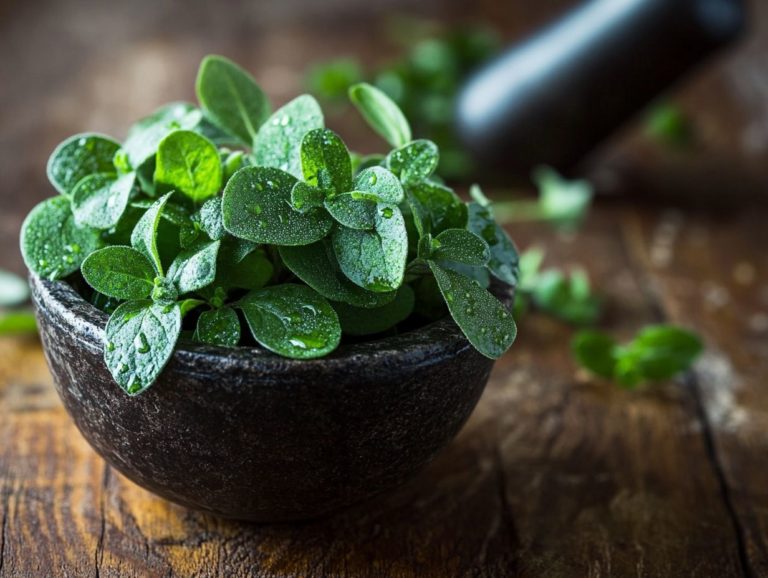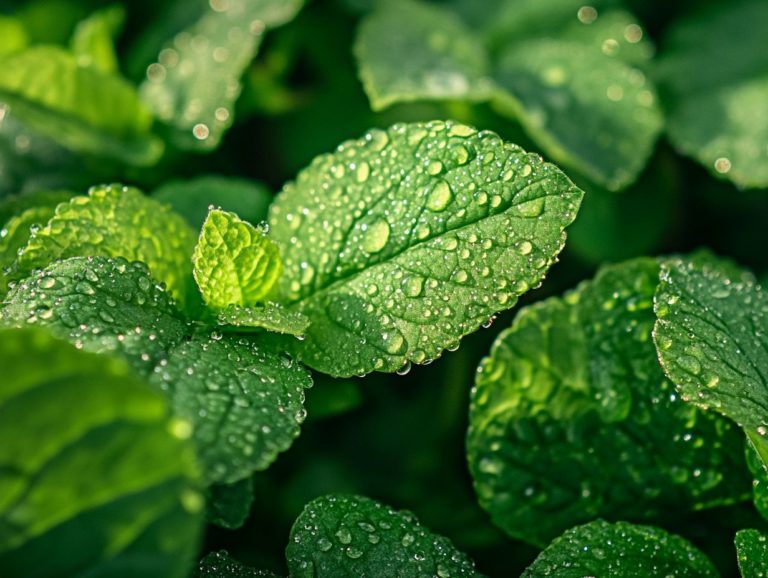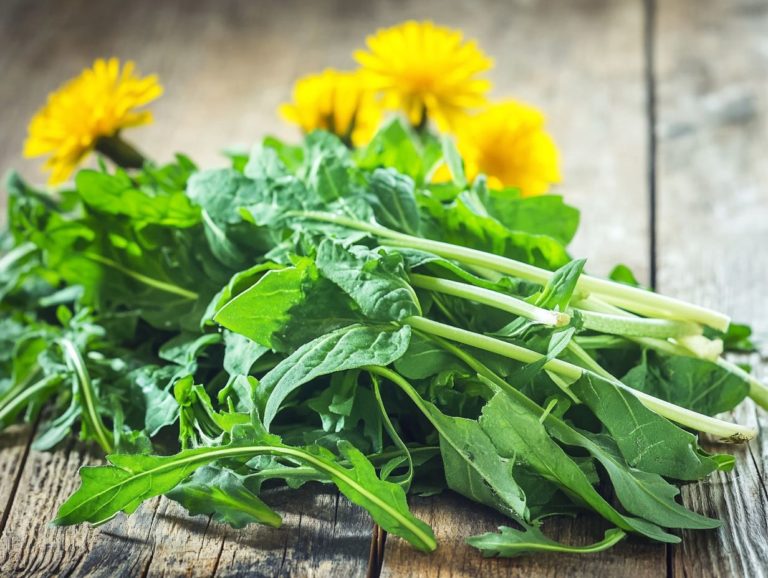Educational Guide to Neem: Benefits and Uses
Neem, often hailed as the “wonder tree,” has earned its well-deserved reputation over centuries in both traditional medicine and agriculture.
This remarkable plant comes with a rich history and many benefits, ranging from promoting skin and hair health to enhancing your oral hygiene.
In this guide, you will delve into the medicinal properties of neem and its Ayurvedic uses, uncover its common applications, and learn how to seamlessly weave it into your daily routine.
You ll also find essential safety considerations and tips on sourcing high-quality neem products.
Get ready to unlock the amazing benefits of neem, including its antibacterial properties that fight germs and antifungal properties that fight fungi, and understand why it truly deserves a place in your wellness arsenal.
Contents
Key Takeaways:

- Neem is a versatile plant with a rich history of traditional use and numerous medicinal properties.
- From skin and hair care to oral health and household cleaning, neem offers a wide range of benefits and uses.
- To incorporate neem into your routine, explore different methods of consumption and application, and consider potential risks and precautionary measures.
What is Neem?
Neem, scientifically recognized as Azadirachta indica, is a fast-growing tree that thrives in the Indian subcontinent and extends its reach to parts of Africa, the Caribbean, and even South America.
This extraordinary plant is revered for its many health benefits, especially in traditional medicine, and it plays a significant role in organic farming through sustainable practices.
Celebrated for its potent antibacterial properties that fight germs and antifungal properties that fight fungi, neem has long been a cornerstone in Ayurveda and other traditional healing systems, making it an essential ingredient in a variety of products designed to enhance health and well-being, including neem products.
Overview and History of Neem
The history of neem, or Azadirachta indica, stretches back thousands of years, deeply embedded in traditional medicine and Ayurveda, where its remarkable healing properties have long been revered.
This ancient tree, often dubbed the ‘village pharmacy,’ has garnered praise across various cultures for its extensive medicinal benefits, which range from skin care to insect repellent qualities.
Historical Ayurvedic texts like the ‘Charaka Samhita‘ and ‘Sushruta Samhita‘ underscore its therapeutic applications, showcasing its effectiveness in treating a wide array of ailments.
As neem spread from India into neighboring regions such as Southeast Asia and Africa, its uses diversified, shaping local healthcare practices and traditional rituals. Neem is experiencing a revival as modern science starts to validate its efficacy, sparking renewed interest in its role in organic farming and natural health remedies.
Benefits of Neem
Neem is celebrated for its remarkable health benefits, boasting powerful antibacterial and antifungal properties. This makes it a highly valuable resource, bridging the gap between traditional medicine and contemporary healthcare practices.
Medicinal Properties and Traditional Uses
The medicinal properties of neem are widely recognized, especially in Ayurveda, where it serves as a remedy for various conditions, including skin diseases and diabetes.
Its leaves, bark, and seeds contain active compounds like nimbidin and azadirachtin, which are natural compounds found in neem that help fight inflammation and germs, enhancing its anti-inflammatory and antimicrobial benefits.
Numerous studies have highlighted neem’s effectiveness in managing acne and eczema, showcasing its remarkable ability to soothe irritated skin while warding off infection.
In folk medicine, practitioners often brew neem leaf tea as a natural method to help regulate blood sugar levels, further supporting its historical use in diabetes management.
With its potent antifungal and antiviral properties, neem has been employed in traditional remedies to combat infections, illustrating its multifaceted role in holistic healing.
Don t miss out on the chance to enhance your health with neem!
Common Uses of Neem
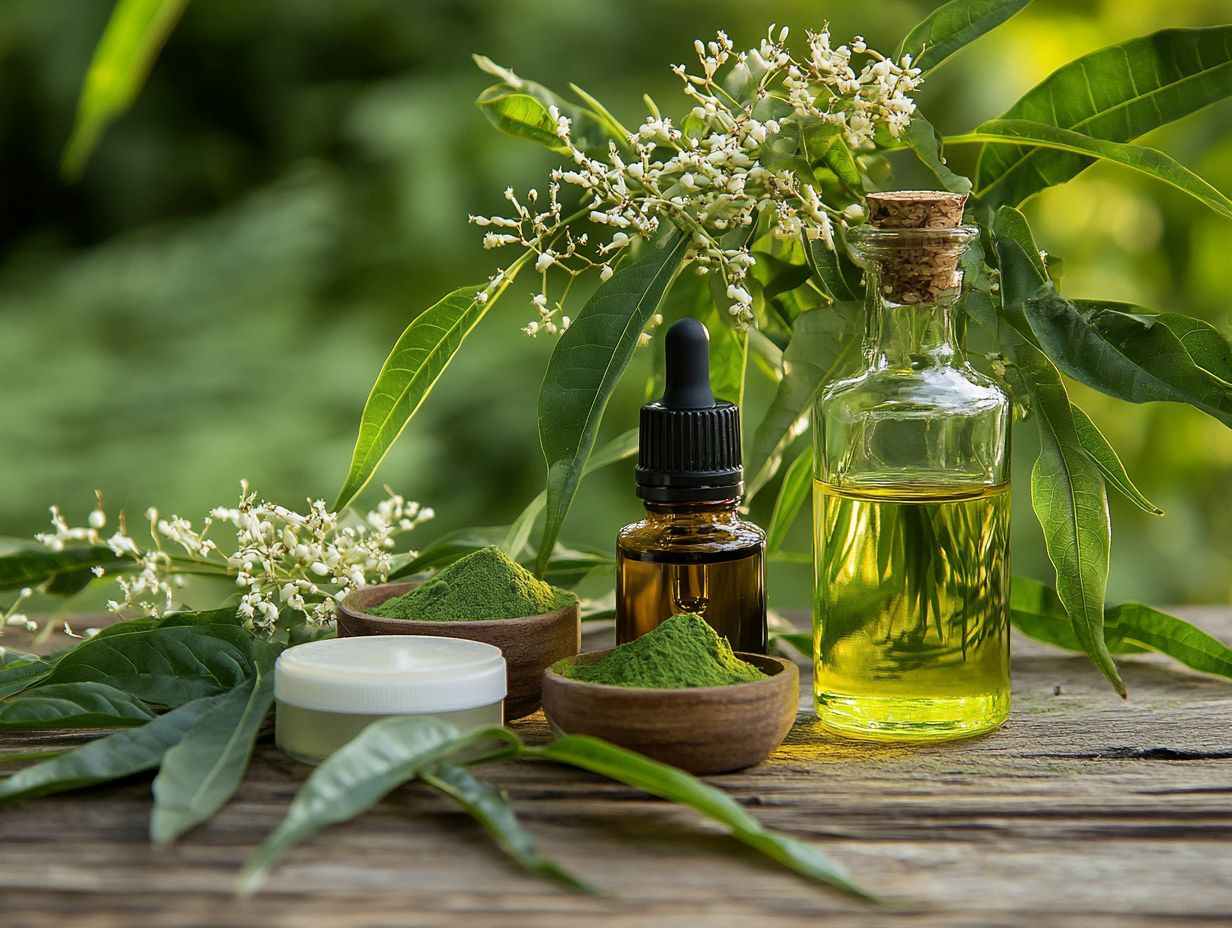
Neem showcases remarkable versatility, seamlessly integrating into various domains. In personal care, you can harness its benefits through neem oil, neem soap, and neem extract.
In gardening, neem serves as an effective insect repellent, enhancing your plant care routine.
Skin and Hair Care
Neem oil and other neem products are celebrated for their impressive benefits in skin and hair care. They tackle conditions like acne and psoriasis, promoting healthy skin and a vibrant scalp.
This ancient remedy is loaded with antibacterial and anti-inflammatory goodness, making it your go-to solution for various skin issues. For example, neem face washes and creams can effectively reduce pesky acne breakouts, while neem-infused shampoos work wonders in combating dandruff and enhancing scalp health.
Its effectiveness in soothing irritation from eczema and other skin irritations is well-documented. People love herbal neem masks because they rejuvenate the skin and give it a natural glow. This demonstrates neem’s holistic approach to beauty, making it an essential ally in your quest for radiant skin and hair.
Oral Health
Neem’s antibacterial properties extend to your oral health, making it a key ingredient in products like neem paste and neem tablets that help keep your teeth and gums healthy.
Research has shown that neem can significantly reduce plaque accumulation and gingivitis. This is why it has become a staple in traditional oral care practices across various cultures.
If you’re looking to incorporate neem into your daily routine, consider these practical tips:
- Use neem twigs, which are natural sticks from the neem tree, as a toothbrush.
- Choose toothpaste containing neem extract.
- Regularly rinse with neem-infused mouthwash.
Using neem-infused mouthwash freshens your breath and boosts your oral health. By taking these small steps to weave neem into your everyday habits, you can elevate your oral health while embracing a time-honored remedy celebrated for its medicinal properties.
Household and Garden
In your household, neem acts as a natural insect repellent. In your garden, neem leaves and bark provide effective pest management without harmful chemicals.
Often dubbed the ‘village pharmacy,’ this versatile tree offers a wealth of benefits beyond just bug repellent. For example, you can dilute neem oil in water and spray it on your houseplants to fend off aphids and spider mites, creating a safe haven for beneficial insects.
Applying a neem-based solution to your outdoor garden forms a protective barrier against caterpillars and beetles. Incorporating neem powder as a soil amendment not only enriches the soil but also deters nematodes and root pests, illustrating its extensive advantages for both your home and garden, including sustainable neem cultivation.
How to Incorporate Neem into Your Routine
Incorporating neem into your daily routine can be easily achieved through a variety of consumption methods. Consider extracting neem oil for its potent benefits, brewing a soothing cup of neem tea, or utilizing neem paste for topical applications.
Each approach offers unique advantages, allowing you to fully embrace the remarkable properties of neem in your life. Start today and discover how neem can transform your health and beauty routine!
Methods of Consumption and Application
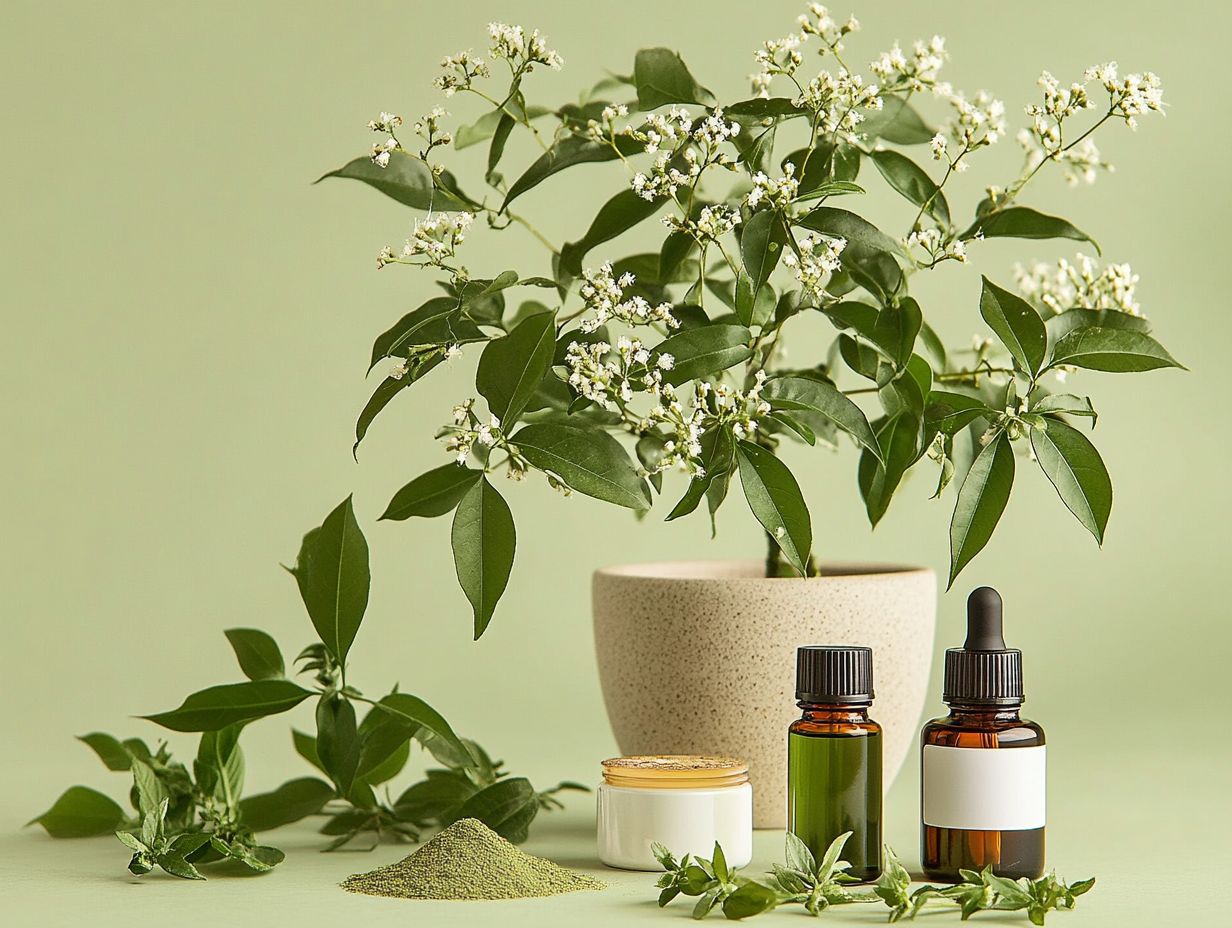
You have several exquisite options for consuming and applying neem, such as brewing neem tea, using neem oil for your skin and hair care, or applying topical neem products for a range of health benefits.
Each method presents its own unique advantages, making neem a truly versatile choice for anyone passionate about holistic health. Drinking neem tea helps cleanse your body of toxins; simply steep fresh or dried leaves in hot water for about 10 minutes, strain, and savor the experience.
If you’re considering topical applications, neem oil can be diluted with a carrier oil a neutral oil used to dilute essential oils and gently massaged into your scalp, promoting healthier hair and helping to reduce dandruff.
For those seeking to soothe their skin, neem-infused creams or masks can alleviate irritation and enhance your overall complexion.
These various methods of consumption and application not only offer health benefits but also fit seamlessly into your daily routine, empowering you to harness the remarkable power of neem with ease.
Safety and Side Effects of Neem
While neem is widely celebrated for its safety and benefits, it’s essential to understand neem safety to use it effectively, including neem allergies, potential risks, and conditions that make using neem unsafe to ensure responsible use.
Potential Risks and Precautions
Be mindful of the potential risks associated with neem usage, including neem toxicity and allergic reactions, as certain individuals require caution and awareness.
Specific populations like pregnant women, nursing mothers, and young children should particularly exercise vigilance since neem can carry various health risks for them. If you have pre-existing conditions, such as liver or kidney issues, it s wise to consult a healthcare professional before integrating neem into your wellness routine.
Watch for signs of a possible allergic reaction, including skin rashes, itching, or gastrointestinal upset; these should never be dismissed. Additionally, be aware of neem allergies which may occur. Performing a patch test before widespread application is a prudent step to identify any adverse reactions.
By understanding and respecting these precautions, you can safely enjoy the myriad neem benefits while minimizing risks.
Where to Find Neem Products
Finding neem products has never been easier, thanks to a wide array of retail options and online resources readily accessible in regions such as India and Australia.
Retail Options and Online Resources
Larger chains like Whole Foods often carry neem-based items, offering a delightful range that includes everything from neem oil to neem soap. You ll also find a plethora of retail options for neem products, from health food stores and pharmacies to specialized online shops like Banyan Botanicals, which often highlight the Ayurvedic uses of neem, making it quite accessible.
If you prefer online shopping, marketplaces like Amazon provide an extensive selection, allowing you to easily compare brands and delve into customer reviews.
For those on the hunt for organic or sustainably sourced options, websites dedicated to herbal remedies and natural wellness, such as Herbalist Herbals or iHerb, prove to be particularly invaluable. The variety encompasses not just traditional neem oils but also neem capsules, neem powder, and neem skincare remedies, catering to your unique preferences while ensuring high quality from reputable suppliers.
Frequently Asked Questions
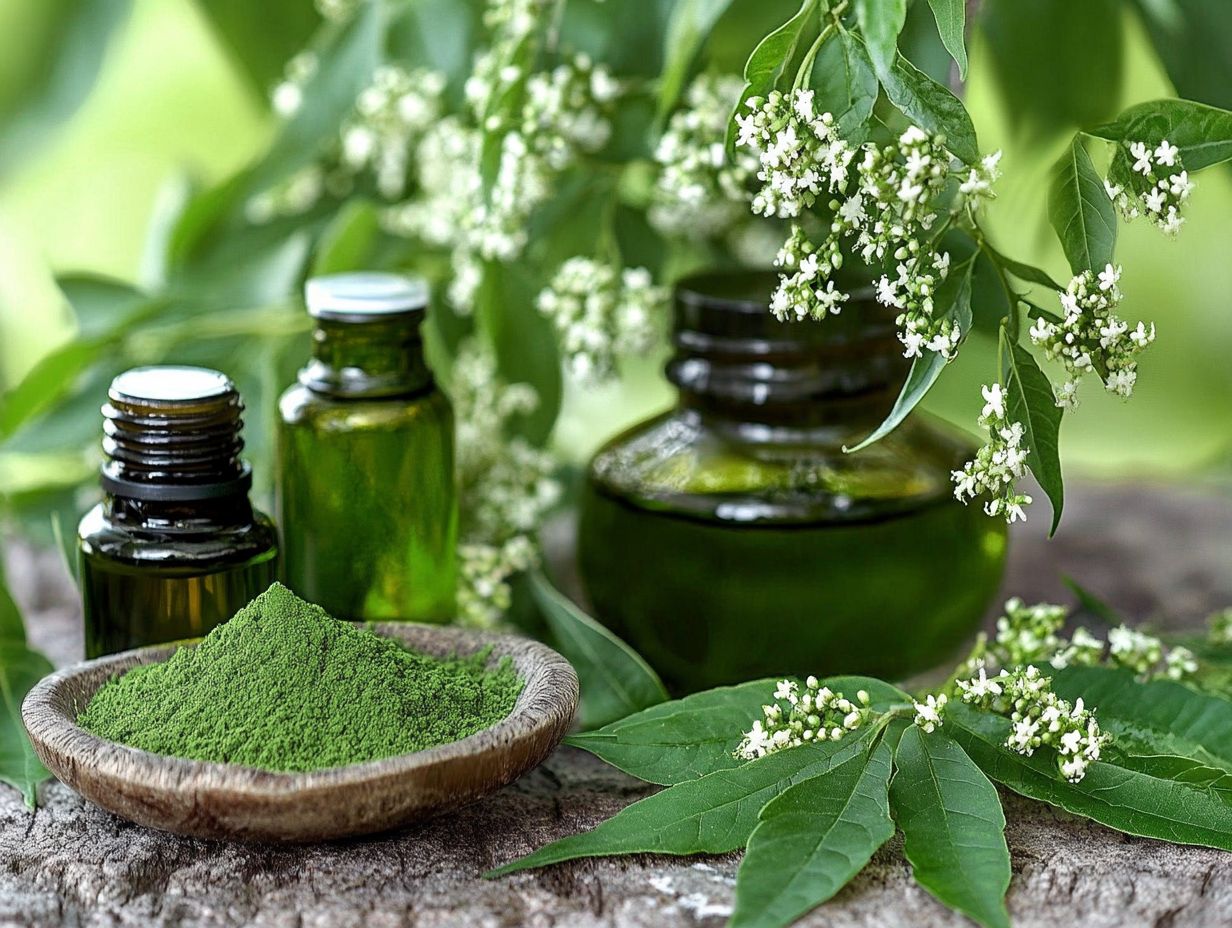
What is neem and what are its benefits?
Neem, or azadirachta indica, is a fast-growing tree native to India that has been used for centuries in traditional medicine and as a natural remedy. Its leaves, bark, seeds, and oil all have various health benefits, including being antibacterial, antifungal, and anti-inflammatory.
Explore neem products today, and feel free to ask questions about your experiences with neem!
How can neem be used for skin care?
People love neem for its amazing ability to treat various skin conditions like acne, eczema, and psoriasis. Don’t miss out on neem s incredible healing properties! It can be used in the form of a face mask, neem soap, or neem oil to soothe and heal skin irritations and infections.
Can neem be used for hair care?
Yes! Neem oil promotes hair growth and improves overall hair health. Use it as a hair mask, add it to shampoo, or massage it into your scalp to tackle dandruff, dryness, and hair loss.
How is neem beneficial for oral health?
Neem offers fantastic benefits for oral health. Its germs-fighting abilities help combat bacteria that cause gum disease and cavities. You ll often find it in natural toothpaste and mouthwash.
Can neem be used as a natural insect repellent?
Absolutely! Neem oil repels insects such as mosquitoes, ticks, and fleas. You can apply it topically to your skin or use it in household cleaning products to keep bugs away.
Are there any precautions to take when using neem?
While neem is generally safe, some people may have neem allergies. Always perform a patch test before using it topically. Also, if you are pregnant or breastfeeding, consult your doctor about neem safety before trying any neem products.

